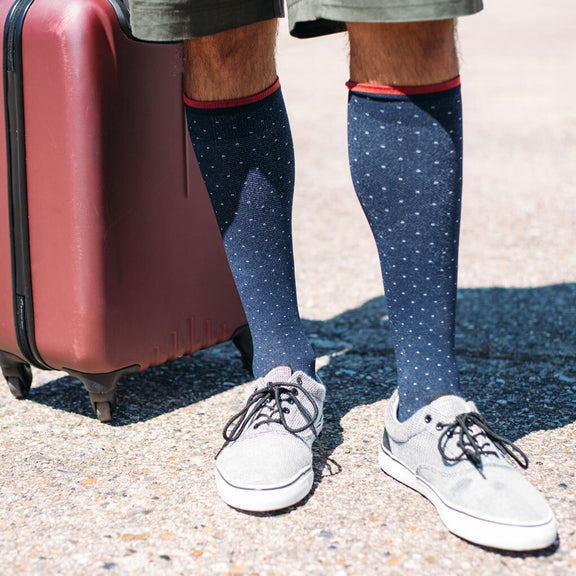Feb 19, 2025
10 Unusual Holiday Laws You Might Not Realise You're Breaking Abroad
By
Sophie Blanchflower
Each year, over 86 million Brits set off to explore new places — soaking up the sights and sounds of exciting holiday spots across the globe. But while you're busy enjoying the local food, landmarks, and attractions, you could be breaking the law without even realising it! From everyday habits to what you wear, there are plenty of unusual laws around the world that can catch travellers off guard.
To help you avoid any unexpected fines (or an awkward chat with the local police), we've rounded up ten strange laws and customs around the world that could get you in trouble.
10 laws you might be accidentally breaking on holiday
Every country has its own set of rules, and what seems normal at home could actually be illegal in another country. Brushing up on local laws before you travel is a great way to avoid any uncomfortable situations while also showing cultural etiquette and respect for local customs. Some of these rules might seem a little unusual, but they're taken seriously by the people who live there.
Here are ten unusual laws around the world to keep in mind for your next trip:
1. Jaywalking - Germany
Nipping across a quiet road when there's no traffic might not seem like a big deal here in the UK, but in Germany, jaywalking is against the law. Even if the street is completely clear, pedestrians are expected to wait for the green light before crossing. If you don't, you could be hit with a fine of 5-10 euros.
And it's not just about avoiding a fine — following the rules is a big part of German culture. Locals see jaywalking as unsafe and inconsiderate, and it's especially frowned upon in front of children as it sets a bad example. So, if you're in Germany, take those extra few seconds to wait for the signal — you'll save yourself some money and avoid getting side-eyed by the locals!
2. Feeding the birds - Venice, Italy
We're no strangers to pigeons in the UK, and plenty of cities here have rules about feeding them. But if you're heading to Venice, you might not realise that tossing a few crumbs to the local birds could land you with a fine. Feeding pigeons or seagulls in St. Mark's Square and other popular areas of the city has been banned since 2008, with fines starting at 25 euros and going up as high as 500 euros!
While it sounds cruel, the rule protects buildings from damage caused by large flocks. The city is so serious about discouraging them that even selling birdseed is banned! So, while it might be tempting to recreate a classic postcard moment of feeding the birds from your hands, it's best to enjoy the views without attracting any feathery friends.
3. Wearing high heels - Athens, Greece
Slipping on your favourite heels for a day in the sunshine might sound like a good idea, but if you're visiting any of Athens' historic sites, you'll need to think carefully about your footwear. Since 2009, wearing high heels at places like the Parthenon and the Acropolis has been illegal, with fines of up to 900 euros for those who break the rules.
The law is there to stop any added damage to these landmarks — after all, thousands of years of history and stiletto heels don't always mix well! If you're planning to explore Greece's ancient ruins, it's best to stick to flats or sandals and leave the heels for dinner and drinks in the evening. Not only will this help you dodge a fine, but you're also less likely to take a tumble during your trip.
4. Dressing in camouflage - Barbados
Camo gear probably isn't the first thing you pack for a beach holiday, but if you're heading to Barbados, it's best to leave anything with a camouflage print at home. Wearing camo clothing is illegal here — and this applies to any colour, not just army green. The same rule exists across several other Caribbean countries, including Jamaica, Grenada, St. Lucia, and Trinidad and Tobago.
This law is in place to prevent civilians from being mistaken for military personnel. And it's not just a slap-on-the-wrist offence — breaking this rule in Barbados could land you a fine of $2,000, a year in jail, or even both! So, if you have any camo-print shorts or jackets, swapping them out for something else in your suitcase is safest.
5. Taking a selfie with the Buddha - Sri Lanka
Snapping a quick selfie to show friends and family is second nature when you're on holiday, but if you're visiting Sri Lanka, you'll need to be extra mindful near the Buddha statues dotted around the country. Taking a selfie with your back turned to the Buddha is seen as highly disrespectful — and it's also against the law.
Sri Lanka takes this rule seriously, and tourists who break it face fines, deportation, or even a suspended prison sentence — as three French tourists found out in 2012. To stay on the right side of the law (and local customs), keep your phone tucked away, take in the sights with your own eyes, and step away from the statue before turning to leave.
6. Drinking alcohol in public - Amsterdam, the Netherlands
Amsterdam may have a reputation as a go-to spot for stag parties and summer holidays, but when it comes to drinking in public, the rules are surprisingly strict.
While bars, cafes, and designated areas are fair game for a tipple or two, drinking alcohol on the streets, in parks, or near train stations is illegal. This law exists to keep the streets peaceful for everyone, and if you're caught breaking it, you could face a fine or even a trip to the local police station for a warning.
7. Snapping a picture inside the Sistine Chapel - Rome, Italy
Taking holiday photos is a great way to make lasting memories, but if you're heading to the Sistine Chapel, you'll need to keep your camera tucked away. Photography and filming inside the chapel are banned, and if you're caught, you'll be asked to leave — and could even be fined.
While banning photos of one of the world's most iconic landmarks may seem harsh, this rule has been in place for decades and was originally because of an agreement with a Japanese broadcaster that funded the chapel's restoration. The original contract expired a long time ago, but the ban has remained in place to help protect the chapel's delicate artwork. The good news is that you can still take photos (without flash) inside the Vatican Museums, so save your shots for before or after you step inside the chapel!
8. Illegal medications - Japan
There's nothing worse than being ill when you're on holiday, and packing your usual cold and flu medicine just in case might seem like a no-brainer. But, if you're heading to Japan, you'll need to double-check what's in your travel bag. Certain over-the-counter medications that are completely legal in the UK — like Vicks inhalers, allergy tablets, and painkillers containing codeine — are banned in Japan.
If you're caught with any illegal medication, you could face some serious consequences, including being detained or even deported. To avoid running into any trouble, check Japan's official import regulations before you travel and, if necessary, bring a doctor's note for any prescription medication you need to carry.
9. Chewing gum - Singapore
Chewing gum might seem harmless, but in Singapore, it's been tightly regulated since 1992. While it's not illegal to chew gum, importing, selling, or distributing it is against the law — unless it's therapeutic, dental, or nicotine gum, which can only be bought from a doctor or registered pharmacist.
Spitting gum out in public is also a serious offence, with hefty fines for anyone caught littering. So, if you're heading to Singapore, it's best to leave your gum at home and opt for mints instead!
10. Driving shirtless - Thailand
Thailand is known for its tropical climate and high humidity, with temperatures often hitting 35°C or above. It's tempting to ditch your shirt to stay cool, but if you're getting behind the wheel — whether in a car or on a scooter — you'll need to keep it on. Driving shirtless is illegal in Thailand, as it’s seen as indecent exposure, and anyone caught doing so could face a fine of up to 500 baht.
Why do some countries have ‘unusual’ laws?
Whether you're heading overseas for a workcation or backpacking through Asia, it's always worth looking into local laws before you go.
Some laws might seem silly or overly strict to visitors, but they usually exist for a reason. Many are in place to protect historic landmarks or cultural traditions. What might seem like a harmless habit in one country can be considered disrespectful — or even dangerous — in another.
For example, bans on high heels in Greece help avoid erosion at sites that have survived thousands of years, while rules against feeding pigeons keep cities cleaner and protect buildings from damage. Even laws that seem outdated, like restrictions on chewing gum in Singapore, were brought in to solve real problems, like littering, that are still enforced today.
Are there any strange laws in the UK?
The UK has its own fair share of unusual laws that might surprise visitors. Some of them date back centuries, while others were introduced in the last few years.
Here are just a few of the strangest laws in the UK that could trip up tourists:
-
It's illegal to fly a kite in a public space — What might seem like a harmless British pastime has actually been against the law since 1839.
-
Being found drunk in a pub is against the law — Yes, really. Under the Licensing Act of 1872, it's illegal to be drunk in pubs, clubs, and even private properties where alcohol is sold.
-
Jumping the queue in a Tube station — London is a busy city, and tourists are always hoping for a way to slip through queues to reach their destination quickly. Unfortunately, cutting the queue in the ticket hall is a criminal offence under TfL by-laws.
-
Dressing up as a police officer or armed forces member — While these might be a popular choice for fancy dress, impersonating an officer in public is illegal under the Police Act of 1996.
- Sliding on an icy street — It's hard to avoid a slip on a frosty day, but deliberately sliding on icy streets is actually illegal because it’s seen as dangerous and a public nuisance.
Are tourists treated differently if they break local laws?
Getting caught breaking the rules abroad can lead to more than just a fine. Some countries are more lenient with visitors, but others have strict penalties regardless of whether you're a local or just passing through.
For example, in places like Singapore and Japan, the law applies equally to everyone, and claiming you didn't know won't get you off the hook. In other destinations, breaking a law tied to cultural traditions — like taking an inappropriate photo at a religious site — might not just get you in legal trouble but also result in backlash from locals.
Part of being a responsible tourist is being aware of the customs and laws in the places you visit. Even if a law seems unusual to you, showing respect for the rules helps you avoid trouble and keeps your travel experience smooth and more enjoyable.
How can you find out more about local laws before travelling?
No one wants their holiday ruined by an unexpected fine (or worse!), so it's always a good idea to check the rules before you go. Luckily, there are plenty of ways to get up to speed with local laws and customs ahead of your trip:
-
Check government and embassy websites — Many countries provide travel recommendations and legal information on their embassy websites. The UK Government's foreign travel advice page is a great place to start.
-
Read travel blogs and guides — Travel bloggers and tourism websites often share first-hand experiences about customs they encounter around the world and what to watch out for.
-
Look up specific laws for your destination — If you're worried about travelling with medication or accidentally breaking the dress codes, searching for "[your destination] travel laws" can give you a clearer picture before your trip.
-
Ask locals or fellow travellers — Online forums, travel groups, and social media communities can be great places to get up-to-date advice from people who've been there recently.
- Visit your local library — Guidebooks often include information on cultural etiquette and legal tips for popular travel spots.
Explore the world comfortably with Trtl
Travelling is all about experiencing new cultures, but knowing the local laws is just as important as knowing the best sights to see. A little research can help you avoid any awkward encounters — so you can focus on enjoying your adventure!
Wherever you're heading next, our Trtl Pillow will make sure your journey's smooth, keeping you comfortable even on long-haul flights. Whether you're exploring city streets or visiting an ancient site, pack your Trtl Flask to stay hydrated without worrying about littering.
For more travel tips and inspiration, including the must-have travel accessories and the most-asked travel queries, see the Trtl Blog.


















